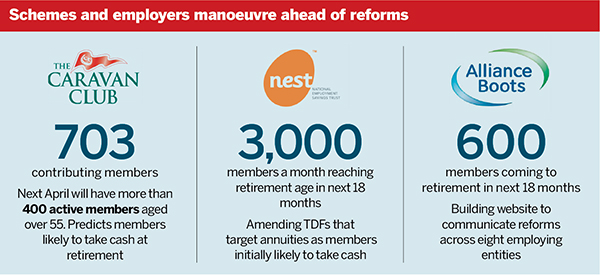DC: The New Investment Journey. It may be a caravan rather than a Lamborghini, but scheme managers across the country are getting ready for a wave of savers cashing in their pension pots come April’s introduction of George Osborne’s retirement flexibilities.
Employers and schemes at last week’s defined contribution investment forum shared their predictions and anxieties on the impact of the Budget’s historic intervention in the DC market.

Roger Woods, pensions manager at The Caravan Club, told the amassed DC scheme managers and experts that the 100-year-old organisation’s site warden staff were now viewing their pension pots as an account to be cleared at retirement.
“The vast majority of our wardens are second, third-career people,” he said. “The canny ones of them have turned around and said, ‘Actually, you are now firmly moving away from DC provision into a savings plan that you as a club are happy to pay an amount into, so therefore I am just purely interested in taking cash at the other end.’”
He said some members of the scheme may well use the cash to buy caravans of their own.
Meanwhile, state-backed pension scheme Nest, which already caters to at least 1.7m workplace savers, has decided to switch its target date funds that currently aim for annuitisation, predicting that its first wave of pensioners will most likely cash out.
“They will have small pots, so most will want to take that all as cash and that will make sense for them,” said chief investment officer Mark Fawcett.
But for larger, less engaged employers, and those with mostly disengaged scheme memberships, there is more uncertainty.
Julie Richards, group director of pensions at Alliance Boots, said that though she welcomed the changes in principle, the employer was still waiting for clarity on the new rules and how providers were going to help clients meet them.
“I guess I’m nervous, and initially we kind of are firefighting in terms of how we communicate the immediate impact to people,” she told the audience.
About 600 people are coming up for retirement in the next 18 months from its group personal pension plan, but Richards said the employer was not getting much engagement from employees since the March Budget.
The health and beauty group, which has eight employing entities in the UK, including household-name retailer Boots, is to launch a website to get the message out to its employees.
Despite the uncertainty, delegates also felt the Budget changes could be used by employers to engage people to contribute more at a younger age.
Richards added: “It’s saying, ‘Look, appreciate that in the past you were paying that money in, it was tied up, you were never going to see it, you were restricted... but look, now you’ve got greater freedom.’”

























